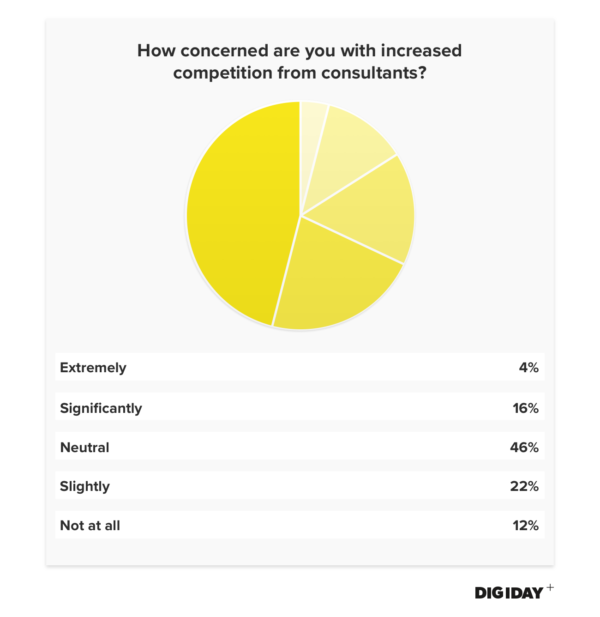Secure your place at the Digiday Media Buying Summit in Nashville, March 2-4
5 things to know this week: agencies use NDAs to cover up harassment, Mashable’s video ambitions and more
This week’s things to know include how ad agencies employ nondisclosure agreements to hide sexual harassment accusations, the market for short-form digital video and more.
NDAs help ad agencies conceal sexual harassment claims
Agencies are using NDAs to suppress sexual harassment claims. Digiday spoke with 15 women who had signed some kind of confidentiality agreement stemming from a case of harassment — both sexual and nonsexual — and also knew of at least one other NDA at the company they worked for at the time.
These women, whose NDAs were part of severance packages, said this use of NDAs to prevent harassment charges from becoming public has protected their harassers, who kept their jobs.
“Big agencies and lawyers put so much pressure on an already difficult emotional situation that they basically bully the employee, eventually wearing them down to settle,” said one New York-based woman who worked at multiple agencies and tried to bring a wrongful termination suit.
One top head of talent at an agency said she used to believe NDAs weren’t a bad idea, but she now feels differently: “It’s time for heads to roll.”
The market for short-form video series thins
Over the past few months, several high-profile video streaming platforms, including Spotify, NBCUniversal’s Seeso and Comcast’s Watchable, have either shut down or scaled back their spending on original content.
It’s unclear who will buy short-form digital video shows in 2018 and beyond — a problem for video producers, digital studios and publishers relying on the scramble for digital video programming to counter Google’s and Facebook’s dominance.
What’s behind the decline of short-form video content:
- Facebook, YouTube Red and Verizon’s Go90, which buy the majority of original digital video programming, want to purchase longer-form content.
- Big content buyers like Netflix, Amazon and Hulu are interested in TV-like content rather than what’s typical on web video platforms. “This cycle is less digital buyers and more TV buyers, and everyone is trying to swim toward that,” said a digital studio executive.
Facebook Watch’s pitch to advertisers
Facebook is shopping Watch to advertisers and agency ad buyers by framing it as a way to maximize their current spend on the platform.
Facebook’s pitch:
- Watch is positioned as what one buyer calls an “additional placement you just check and tick off” for advertisers familiar with Facebook’s ad infrastructure.
- The platform is tempting buyers with its test of pre-roll ads in Watch shows.
- Facebook is citing internal data to agencies that shows people share long-form video and watch it longer.
Publishers pursue subscriptions using cross-departmental teams
With the scale era waning, publishers are creating teams of staffers from across their departments to work together to grow subscriptions and loyalty.
Two examples:
- The Economist established three “tribes” — one each for its desktop site, newsletters and mobile site — containing product, editorial and audience staffers to work on product and strategy initiatives like boosting readers’ time on site.
- The Washington Post formed a subscriptions team comprising audience, design and product staffers, allowing it to complete projects related to retention in days rather than weeks.
“There has been tension in the past [between these groups],” said Anna Rawling, evp of consumer experience and product strategy at The Economist. “People still have their own agendas, but this provides a very good steer.”
Mashable pares back its video efforts
In the wake of its sale to Ziff Davis, Mashable — which pivoted hard to video — is downsizing its video endeavors.
The changes:
- The publisher is shifting its focus from producing longer-form video shows for linear TV networks such as Turner and streaming platforms like Go90 to social content and distribution, including Facebook Watch shows and its Snapchat Discover channel.
- Video division Mashable Studios shed 13 of its 50 staffers.
- Mashable Studios President Eric Korsh is leaving the company.
Bonus research
Only 4 percent of the industry leaders we surveyed at the Digiday Agency Summit said they were “extremely concerned” about increased competition from consulting firms. Subscribe to Digiday+ risk-free for your first 30 days to get more research like this.

More in Marketing

Thrive Market’s Amina Pasha believes brands that focus on trust will win in an AI-first world
Amina Pasha, CMO at Thrive Market, believes building trust can help brands differentiate themselves.

Despite flight to fame, celeb talent isn’t as sure a bet as CMOs think
Brands are leaning more heavily on celebrity talent in advertising. Marketers see guaranteed wins in working with big names, but there are hidden risks.

With AI backlash building, marketers reconsider their approach
With AI hype giving way to skepticism, advertisers are reassessing how the technology fits into their workflows and brand positioning.








